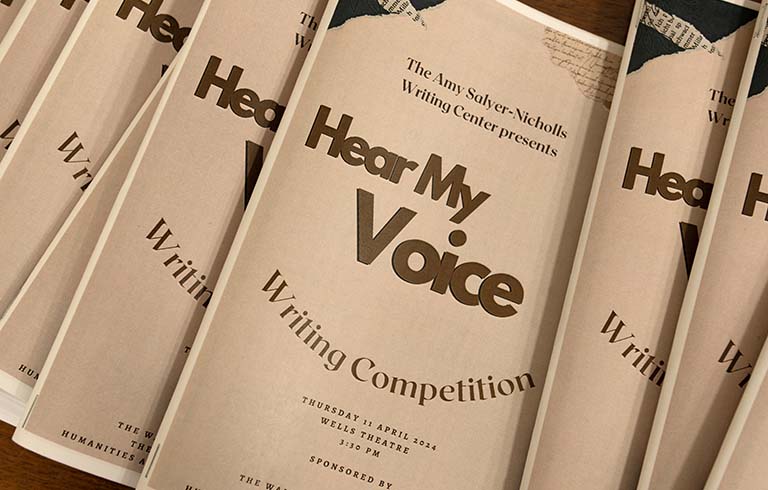
Winners honored in Trine writing competition
Trine University and the Amy Salyer-Nicholls Writing Center honored the winners of the annual Hear My Voice writing competition on April 11 in Wells Theater.
May 10, 2016
A recent event gave two Trine University professors and a student the opportunity to work on projects designed to help develop solutions for NASA.
Associate Professor of Electrical Engineering Andy Mitofsky, Ph.D.; Assistant Professor Tim Carver in the Department of Mathematics and Informatics; and Devin Gingerich, a senior computer engineering major, traveled to the Cleveland site for the International Space Apps Challenge from April 22-24.
The project Mitofsky worked on advanced to another round of judging, while Gingerich served as the team leader on his group’s project.
The event was held in the Mission Integration Center at the NASA Glenn Research Center.
One of the world’s largest hackathons, Space Apps is a two- to three-day event held at locations around the world that invites members of the public from diverse backgrounds to work together to solve a variety of challenges related to NASA’s mission.
Mitofsky served as part of Team Dragonfly, which worked to develop a project related to asteroid mining.
“I thought (Space Apps Challenge) would be a good chance to learn, to work with creative and intelligent people, and to hear ideas and solutions that other people came up with,” Mitofsky said.
“We designed a sensor package and delivery vehicle that could be used to land on asteroids. They were inspired by the shape of a dragonfly and the shape of a porcupine quill,” she said. “We identified a cluster of asteroids as possible targets to study. We also built a demonstration sensor package that sent sensor data to a cellphone. I helped work on the demo sensor package while other people in the group did the design of the sensor package and vehicle, and research on asteroids.”
Team Dragonfly’s project was nominated for the global level of competition. Mitofsky said she expects the work Team Dragonfly submitted to go through another round of judging within the next month.
The Challenge was the first hackathon Gingerich had ever attended. Besides the opportunity to participate in the event, Gingerich said he enjoyed the opportunity to visit a NASA facility and interact with engineers there.
“It was such a surreal venue,” he said. “I got to work with people who were as equally as confused as I was, but we all collaborated to accomplish our goal.”
Gingerich served as the lead of a team that developed a smartphone app called “Symptom Log.” The app gathers data about a user’s respiratory ailments and correlates it with air quality data from NASA, to track the contribution of air pollution to respiratory illness.
“I learned that I can really do a lot more with my skill set than I thought,” he said. “I used programs and services that I have never used before. I was just amazed at how much I was able to accomplish in such a short time.”
Carver said Mitofsky had approached him a year ago about attending this year’s event. Carver, whose background has included designing video games, served in a different group that worked on developing a computer program to simulate a colony on Mars.
“I coordinated most of the work and focused the team on the problems we could handle in a weekend. A video game/simulation can take a team of programmers 12-18 months to build,” he said. “I also wrote some of the programs. We worked on the highest-need objectives, with the possibility of expansion at a later time.”
“I liked the creativity and imagination of the participants,” he said, “and I learned that there are no limits to what our species can come up with when we really work together.”